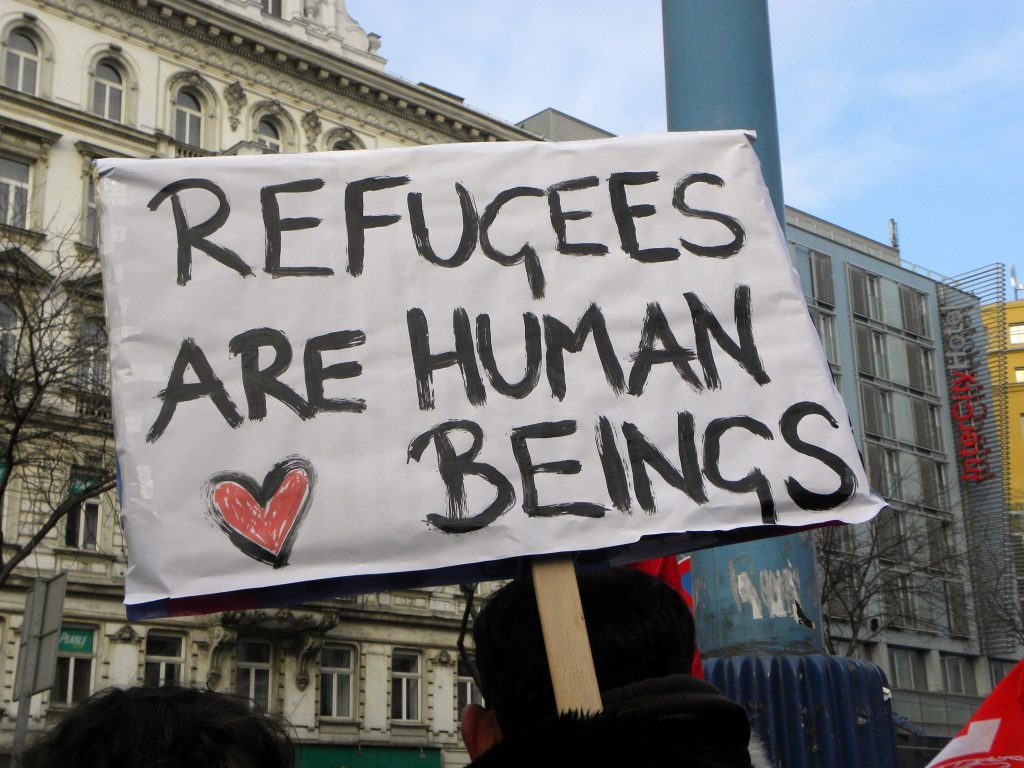
Migrant or refugee – does the label even matter?
by Tania Stein
The anti-immigration rhetoric that pervades much of the tabloid media, especially around debates over Brexit or the so-called ‘Migrant Crisis,’ often focuses on ‘economic migrants’ and ‘fake’ refugees. They have been depicted as “swarming” or “flooding” the UK with the sole aim of living off the state, and this discourse has undoubtedly incited fear and hatred of refugees and migrants. In an attempt to demonstrate their ‘unworthiness’ of refuge in this country, the media has often chosen to focus on symbols of wealth and wellbeing that they see to be shown by those arriving in Europe.
Access to mobile phones was a reoccurring theme in the tabloid media, and this Daily Mail article focusing on refugees taking selfies on the “picturesque” island of Lesbos is a perfect example of this. Through their extended metaphor of holidaying, they delegitimise the refugees’ claim to asylum, and detract from the persecution and dangers in the refugees’ home countries that have caused them to undergo such a perilous journey. In reality, the mobile phones are not a luxury for the refugees, but in many cases serve as a lifeline for them, allowing them to keep in contact with loved ones, and send and receive information that could be critical to their survival.
The attempt to undermine the real causes of people fleeing to Europe across the Mediterranean has been echoed by politicians as well as tabloid media. Nigel Farage, known for his strong anti-immigration and nationalist stance, claimed that “what you find is that most people aren’t refugees, they’re young males, effectively economic migrants”. This notion of it being wealthy, able-bodied young men coming to Europe, constructs the idea that they are not actually legitimate refugees fleeing from danger, but posing as refugees in order to benefit from moving to Europe. This was a common theme among tabloid news, demonstrated by this Express article entitled “Are these happy young men really timid souls fleeing war and persecution?”
This is why the choice to label them as ‘migrants’ rather than ‘refugees’ has become so politicised. In 2015, a number of news broadcasters, including the BBC, came under scrutiny for their use of the word ‘migrants’ to label those travelling across the Mediterranean. This word has a distinctly negative connotation, due to the metaphors of “floods” and “invasions” so often utilised by the media, in order to demonise and isolate them, rather than acknowledge the real reasons behind their arrival in Europe.
However, the actual distinction between a refugee and a migrant has become decidedly more complex in recent years (Zetter, 2007). Minority groups are often persecuted in ways that have a direct impact on their socio-economic situation, so a search for a better economic situation is often one of the causes that people come to Europe, but as a result of and in conjunction with persecution.
Moreover, the traditional depiction of refugees as poor and destitute is not necessarily an accurate one – groups that are persecuted are not by default those living in poverty. The focus on mobile phone ownership not only ignores how affordable technology has become and equates persecution to poverty, but also fails to acknowledge how vital mobile phones have become for those fleeing.
The implications of the labels assigned to those arriving in Europe are huge. However, it is not just the tabloid media that creates these negative discourses concerning refugees and migrants. As Fox et al. (2012) argue, it is the combination of state immigration policy as well as tabloid journalism that creates this notion that they come to live off the state. Immigration policy does not permit asylum seekers to be employed whilst their claim is being processed, forcing them to “depend on benefits or work illegally” (Sales, 2002, p. 464). This, in turn, allows the tabloid media to write them off as not wanting to integrate or become part of our society. The regulations that isolate and demonise asylum seekers therefore only serve to support the anti-immigrant rhetoric that the tabloid media promotes, thereby increasing support for right-wing nationalist parties.
The way we talk about refugees and migrants needs to be urgently addressed, as by conveying them as undeserving and not genuine, we isolate and ostracise them, detracting from the real issue of the atrocities that drive them to leave their homes and seek refuge.
References
Fox, J., Moroşanu, L. and Szilassy, E. (2012). ‘The Racialization of the New European Migration to the UK’, Sociology, 45(4), pp. 680-695.
Sales, R. (2002). ‘The Deserving and the Undeserving? Refugees, asylum seekers and welfare in Britain’, Critical Social Policy, 22(3), pp. 456-478.
Zetter, R. (2007). ‘More Labels, Fewer Refugees: Remaking the Refugee Label in an Era of Globalization’, Journal of Refugee Studies, 20(2), pp. 172-192.

0 Comments